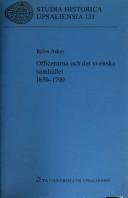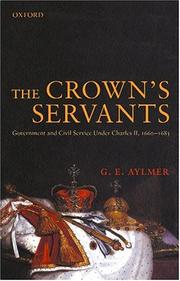| Listing 1 - 10 of 236 | << page >> |
Sort by
|
Book
Year: 2020 Publisher: Washington, D.C. : The World Bank,
Abstract | Keywords | Export | Availability | Bookmark
 Loading...
Loading...Choose an application
- Reference Manager
- EndNote
- RefWorks (Direct export to RefWorks)
Public health systems that are capable of disease surveillance and action to prevent and manage outbreaks require trustworthy community-embedded public health workers who are empowered to undertake their tasks as professionals. Economic theory on incentives and norms of agents tasked with performing activities that society cares about yield direct implications for how to recruit and manage frontline health workers to promote trustworthiness and professionalism. This paper provides novel evidence from a survey of public health workers in Bihar, India's poorest state, that supports the insights of economic theory and taken together yields ideas that can immediately be put to work in policy responses to the COVID-19 crisis. These ideas address problems of governance and trust that have bedeviled health policymakers. Managing the current and preventing future pandemics requires going beyond technical health policies to the political institutions that shape incentives and norms of health workers tasked with implementing those policies.
Bureaucrats --- Coronavirus --- COVID-19 --- Disease Control --- Government Policy --- Health Services --- Health, Nutrition and Population --- Local Government --- Outbreak Management --- Pandemic Response --- Politicians --- Public Health
Book
Year: 2018 Publisher: Washington, D.C. : The World Bank,
Abstract | Keywords | Export | Availability | Bookmark
 Loading...
Loading...Choose an application
- Reference Manager
- EndNote
- RefWorks (Direct export to RefWorks)
This paper investigates the consequences of granting politicians power over bureaucrats in the implementation of small-scale public infrastructure projects. While potentially bolstering the incentive for the executive to perform, increased legislative oversight may lead to distortions in the technocratic process for political gain. By assembling a nationally representative data set from Nigeria that tracks public projects from inception to audit, the paper finds evidence of a clear trade-off between political oversight and bureaucratic autonomy. Using an instrumental variables strategy in which early career choices of politicians are key determinants of legislative committee membership, the analysis finds that legislative influence increases the likelihood that a project is launched by 18 percent, but at the cost of reducing project quality by 15 percent and increasing the reported misuse of funds. The results highlight the fundamental tension between bureaucratic inaction and political corruption.
Agriculture --- Bureaucrats --- Decentralization --- Educational Sciences --- Food Security --- Health Care Services Industry --- Hydrology --- Industry --- International Economics and Trade --- International Trade and Trade Rules --- Politicians --- Public Goods
Book
Abstract | Keywords | Export | Availability | Bookmark
 Loading...
Loading...Choose an application
- Reference Manager
- EndNote
- RefWorks (Direct export to RefWorks)
What determines the distribution of information acquired within the hierarchy of a public organization? Without market processes, the generation and absorption of information in bureaucracy relies on individual actors undertaking costly action to acquire it. This paper reports on comparisons between individual-level claims by public officials in the Government of Ethiopia regarding the characteristics of local constituents they serve and objective benchmark data. Public officials make large errors about their constituents' characteristics. The errors of 49 percent of public officials are at least 50 percent of the underlying benchmark data. Given public officials' stated reliance on this information to make public policy decisions, such mistakes imply a substantial misallocation of public resources. The results are consistent with classic theoretical predictions related to the incentives that determine information acquisition in hierarchies, such as de facto control over decision making and an organizational culture of valuing operational information. A field experiment implies that these incentives mediate the effectiveness of interventions aimed at improving the information of public-sector agents.
Agriculture --- Bureaucrats --- De facto governments --- Decentralization --- Democratic government --- Education --- Educational sciences --- Energy --- Energy policies and economics --- Food security --- Governance --- Health care services industry --- Industry --- Information --- Public administration
Book
ISBN: 9211231256 Year: 1998
Abstract | Keywords | Export | Availability | Bookmark
 Loading...
Loading...Choose an application
- Reference Manager
- EndNote
- RefWorks (Direct export to RefWorks)
Civil service --- -Bureaucrats --- Career government service --- Civil servants --- Government employees --- Government service --- Public employees --- Public service (Civil service) --- Public administration --- Public officers --- Public service employment --- Personnel management --- -Congresses --- Law and legislation --- Legal status, laws, etc. --- -Personnel management --- Bureaucrats --- Personnel management&delete& --- Congresses

ISBN: 9780520215092 0520215095 Year: 2000 Publisher: Berkeley University of California press
Abstract | Keywords | Export | Availability | Bookmark
 Loading...
Loading...Choose an application
- Reference Manager
- EndNote
- RefWorks (Direct export to RefWorks)
Civil service --- Fonction publique --- Examinations --- History --- Concours --- Histoire --- -Bureaucrats --- Career government service --- Civil servants --- Government employees --- Government service --- Public employees --- Public service (Civil service) --- Public administration --- Public officers --- Public service employment --- -History --- Law and legislation --- Legal status, laws, etc. --- History. --- -Examinations --- Bureaucrats --- Examinations&delete&

ISBN: 9155414788 Year: 1983 Publisher: Stockholm Almqvist och Wiksell
Abstract | Keywords | Export | Availability | Bookmark
 Loading...
Loading...Choose an application
- Reference Manager
- EndNote
- RefWorks (Direct export to RefWorks)
Aristocracy (Political science) --- -Civil service --- -Bureaucrats --- Career government service --- Civil servants --- Civil service --- Government employees --- Government service --- Public employees --- Public service (Civil service) --- Public administration --- Public officers --- Public service employment --- Aristocracy --- Political science --- History --- Law and legislation --- Legal status, laws, etc. --- Sweden --- Politics and government --- -Aristocracy (Political science) --- History. --- -History --- Bureaucrats

ISBN: 019820826X Year: 2002 Publisher: Oxford Oxford university press
Abstract | Keywords | Export | Availability | Bookmark
 Loading...
Loading...Choose an application
- Reference Manager
- EndNote
- RefWorks (Direct export to RefWorks)
Civil service --- -Bureaucrats --- Career government service --- Civil servants --- Government employees --- Government service --- Public employees --- Public service (Civil service) --- Public administration --- Public officers --- Public service employment --- History --- -Law and legislation --- Legal status, laws, etc. --- Great Britain --- Politics and government --- -Civil service --- -History --- -Great Britain --- Bureaucrats --- Law and legislation
Book
ISBN: 0774666404 Year: 1973 Publisher: Quebec : Presses de L'universite Laval
Abstract | Keywords | Export | Availability | Bookmark
 Loading...
Loading...Choose an application
- Reference Manager
- EndNote
- RefWorks (Direct export to RefWorks)
fonction publique --- canada --- openbaar ambt --- Civil service --- Bureaucrats --- Career government service --- Civil servants --- Government employees --- Government service --- Public employees --- Public service (Civil service) --- Law and legislation --- Legal status, laws, etc. --- Public administration --- Public officers --- Public service employment
Book
ISBN: 9264268901 9264268898 Year: 2017 Publisher: Paris : OECD,
Abstract | Keywords | Export | Availability | Bookmark
 Loading...
Loading...Choose an application
- Reference Manager
- EndNote
- RefWorks (Direct export to RefWorks)
"National schools of government operate in a context of rapidly changing needs and expectations for governments, citizens and civil servants. Drawing on a 2014 survey, the report reviews how schools of government are adapting to address countries' most pressing political and economic challenges. It analyses best practices, and includes recommendations on designing and implementing whole-of-government and organisation-specific civil service learning and development strategies. The report suggests ways to align learning programmes with the priorities of national governments, to enhance innovative techniques in the delivery and content of learning, and to ensure their stable and adequate funding"--Back cover.
Civil service --- Training of. --- Bureaucrats --- Career government service --- Civil servants --- Government employees --- Government service --- Public employees --- Public service (Civil service) --- Public administration --- Public officers --- Public service employment --- Law and legislation --- Legal status, laws, etc.
Book
ISBN: 9290560908 Year: 1998 Publisher: Bruxelles : Institut International des sciences administratives,
Abstract | Keywords | Export | Availability | Bookmark
 Loading...
Loading...Choose an application
- Reference Manager
- EndNote
- RefWorks (Direct export to RefWorks)
Civil service --- Public administration --- Bureaucrats --- Career government service --- Civil servants --- Government employees --- Government service --- Public employees --- Public service (Civil service) --- Law and legislation --- Legal status, laws, etc. --- Public officers --- Public service employment
| Listing 1 - 10 of 236 | << page >> |
Sort by
|

 Search
Search Feedback
Feedback About UniCat
About UniCat  Help
Help News
News